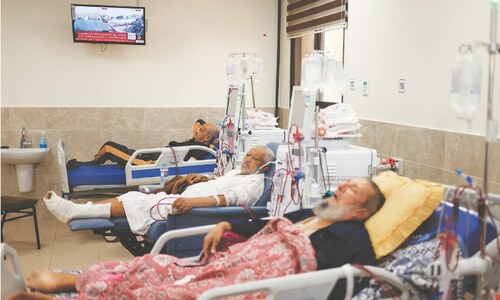• Tanks roll into northern part of besieged territory
• Palestinian death toll crosses 7,000, 35 hospitals closed
• Arab states rage against forced displacement and collective punishment of Palestinians
GAZA CITY: Israeli ground forces mounted an invasion of Gaza in the early hours of Thursday, amid growing anger across the Arab world over Tel Aviv’s relentless bombardment of the besieged Palestinian enclave.
According to the Israeli army radio, this was its military’s biggest incursion into northern Gaza since Oct 7.
The military later released video on X (formerly Twitter) showing armoured vehicles crossing the highly fortified barrier from Israel and blowing up buildings “in preparation for the next stages of combat”.
Just hours earlier, Israeli PM Benjamin Netanyahu had delivered a nationally televised address to Israelis still grieving and furious after Hamas’s October 7 attacks, telling them “we are in the midst of a campaign for our existence”.
The Israel Defence Forces described the operation as a “targeted raid” that hit “numerous terrorist cells, infrastructure and anti-tank missile launch posts”.
It said the operation was “preparation for the next stages of combat”, adding that “the soldiers have since exited the area and returned to Israeli territory”.
Palestinians said Israeli air strikes had pounded the territory again overnight and those living in central Gaza, near the Bureij refugee camp and east of Qarara village, reported intensive tank shelling all night.
A total of 7,028 Palestinians have been killed in the Israeli air strikes, including 2,913 children.
“Behind every announced number, there is a known human being with a name and an identity,” ministry spokesman Dr Ashraf al-Qidra said.
He also urged those who doubted its figures to examine its methodology. Earlier, US President Biden came under fire for stating that he has “no confidence” in the figures being issued by the Hamas-run health ministry.
The director of the Nasser hospital in the southern city of Khan Yunis, Nahed Abu Taaema, said the bodies of 77 people killed in air strikes had been brought in overnight, most of them women and children.
Entire neighbourhoods have been razed, surgeons in hospitals overwhelmed with wounded carry out procedures without anaesthetic, and ice cream trucks have become makeshift morgues.
“They’re not waging war on Hamas, they’re waging war on children,” lamented one resident, Abu Ali Zaarab, after his family home was bombed in the southern town of Rafah. “It’s a massacre.”
The UN says 12 of the territory’s 35 hospitals have closed due to damage or insufficient fuel, and a key UN aid agency serving almost 600,000 Palestinians said it “began to significantly reduce its operations”.
Aid agencies have also warned that more people will die if medical equipment, water desalination plants and ambulances stop operating because of a lack of fuel.
Once the generators stop, hospitals will “turn into morgues”, the Red Cross has warned. Hospitals are also struggling with a shortage of medicines and equipment.
Arab criticism
As the bloodshed continued with no sign of a let-up, the foreign ministers of the United Arab Emirates, Jordan, Bahrain, Saudi Arabia, Oman, Qatar, Kuwait, Egypt and Morocco on Thursday condemned the targeting of civilians and violations of international law in Gaza.
Their joint statement said Israel’s right to self-defence did not justify breaking the law and neglecting Palestinians’ rights. The Arab ministers condemned forced displacement and collective punishment of Palestinians in Gaza.
They also criticised Israel’s occupation of Palestinian areas and called for more efforts to implement a two-state solution to the decades-long conflict — an idea at the heart of long-moribund peacemaking.
“The absence of a political solution to the Palestinian-Israeli conflict has led to repeated acts of violence and suffering for the Palestinian and Israeli peoples and the peoples of the region,” it said.
Published in Dawn, October 27th, 2023














































Dear visitor, the comments section is undergoing an overhaul and will return soon.